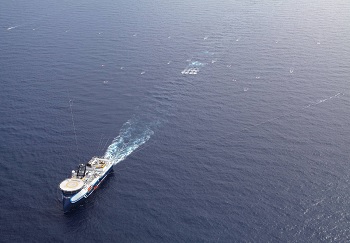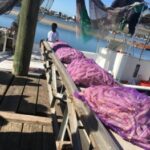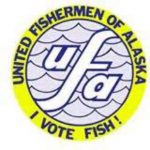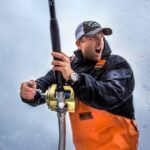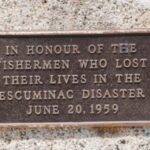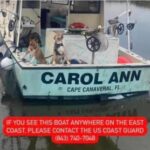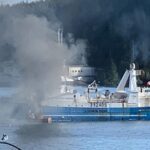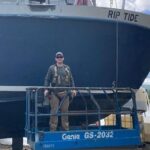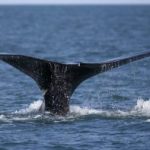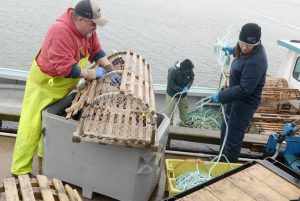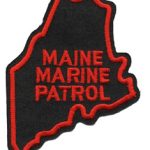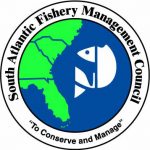Tag Archives: Maryland
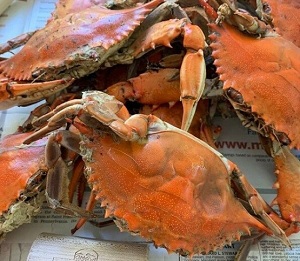
Md. crabbing industry fears long-term impacts of 2020 visa shortages – “Finding Americans that are willing to do this job, it’s not happening.”
Maryland’s famous crab industry is facing an uphill battle. With another year of visa caps, there’s a severe shortage of migrant workers to work as crab pickers ― and few Americans willing to do the job. This year, Maryland crabbers fear for the life of an industry that has been in their families for generations. Only nine crab processors ― which represent 95% of the state’s crab meat production ― remain in Maryland. The processors ― or picking houses ― rely on about 500 foreign seasonal workers to pick crabmeat each year. To work in the United States those workers need H-2B visas designated for temporary non-agricultural workers. >click to read< 18:54
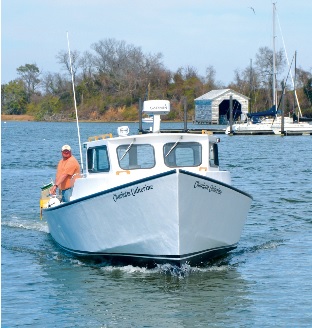
Father and son continue the Tilghman Island boatbuilding tradition
John C. Kinnamon Sr. and his son J.C., of Tilghman Island, Maryland are steadily turning out fiberglass-over-wood Chesapeake Bay deadrise workboats for Maryland and Virginia commercial fisherman. The Kinnamons are native Tilghman Islanders. Their lives as professional boatbuilders are strongly tied to their growing-up years, when commercial fishing and boatbuilding were vital to island life. They each own commercial fishing boats and work in Maryland’s blue crab trotline fishery. J.C., with the help of his father, builds about four new glass-over-wood deadrise workboats a year. With knowledge that comes from first-hand experience, the Kinnamons have clear insight into what a Chesapeake Bay waterman wants and needs in a workboat. >click to read< 10:20
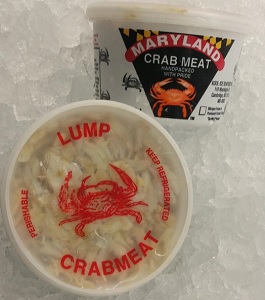
Seafood industry visa fix in question after Coronavirus outbreak
With the aid of lawmakers, seafood businesses in Maryland, Virginia, Alaska and North Carolina last month won federal approval of an additional 35,000 visas for non-immigrant workers, but the timing couldn’t have been worse. Within days, the coronavirus pandemic began shutting down businesses, including restaurants and retail outlets the seafood industry supplies. Some seafood operations let employees go, while others have hired fewer people than they would in a more typical season. Jack Brooks, president of J.M. Clayton Seafood Co. in Cambridge, Maryland, explained that the seafood industry is a seasonal business and the coronavirus has hit the hardest during the industry’s prime time. >click to read< 13:16
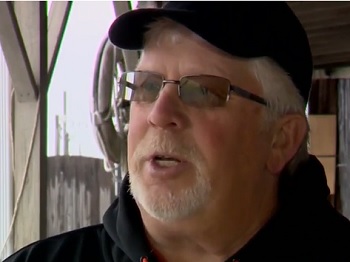
Coronavirus: Maryland seafood industry affected by outbreak
“Right now, the climate in the seafood business is absolutely horrific ever since the announcements that eat-in restaurants were shut down. We really took it on the chin. It virtually shut down the last two weeks that were left in the oyster season,”, Out on the water, those who catch the oysters are feeling the pain, as well, on what was set to be one of the better oyster seasons on record. “It kind of put us out of business and now we’re looking at spring fishing and going into summer fishing, and the markets are slowed almost to a standstill for that and now we’re worried about the crabs,” said Jim Reihl, Maryland Oysterman’s Association president. Video, >click to read< 13:57
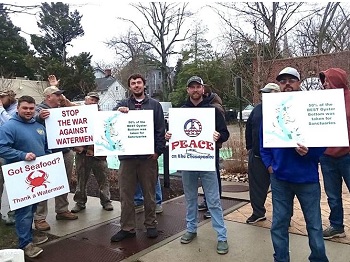
Lawmakers kill SB948 bill threatening watermen’s oyster licenses
A bill that recently prompted hundreds of watermen to descend on the Maryland State House to protest threats to their ability to harvest oysters has been withdrawn from consideration. Senate bill 948’s axing marks a legislative victory for Maryland watermen, who have had to defend their livelihoods from state regulation on numerous occasions through the years. “We’re tickled that it was killed,” said Jeff Harrison, president of the Talbot Watermen Association. more, >click to read< 07:14
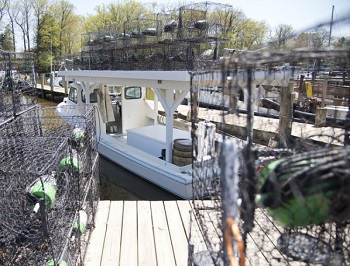
Council passes legislation ending zoning dispute between watermen and a neighbor
When boys in the Whitehall Beach neighborhood reach teenage years, they go and work for the watermen. Some stay for a long time, some don’t, but Pat Donoho, who has lived across the street from the creek for 51 years, said the length of time is not as important as what they learn: a good work ethic. Donoho’s son was one of them — which is why she turned up to the Anne Arundel County Council chambers Tuesday night to testify in support of a bill that allows for watermen’s commercial use in certain residential areas, which were at risk due to zoning challenges. The council unanimously passed the bill following public comments. >click to read< 13:28
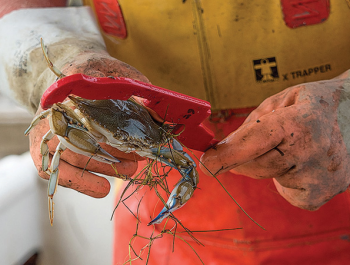
Not Fake News! Low salinity suspected for poor crab harvest in Upper Chesapeake
At the beginning of July, media across Maryland delivered good news for those planning a traditional feast of Chesapeake Bay blue crabs on Independence Day.,,, “The survey is in,” echoed WMAR, another Baltimore station, “and it comes with great news for Maryland crab lovers!” Someone apparently forgot to tell the crabs, at least in the Upper Bay. While supplies were generally ample in the Lower Bay through spring into summer, crabbers in other places had a hard time finding enough of the crustaceans to satisfy their crab-craving customers. “In 43 years of crab potting, this has been the worst I’ve seen,” Charles County waterman Billy Rice,,, >click to read< 14:36
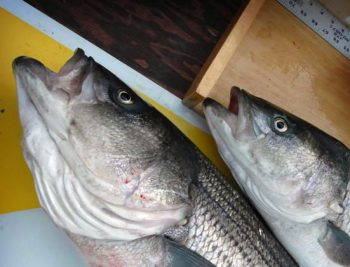
Maryland overfishing imperils rockfish population – Recreational anglers are largely responsible
“The recent stock assessment shows that early action is needed to slow the decline and restore this fishery to sustainable levels,” Virginia Marine Resources Commissioner Steven G. Bowman said in a statement.,,, Recreational anglers are largely responsible. Since 2008, they have killed eight times more striped bass than commercial fishermen, with Maryland anglers harvesting a huge haul: nearly three times the number of fish taken by Maine, New Hampshire, Rhode Island, Connecticut, Delaware and North Carolina — combined. >click to read<14:49
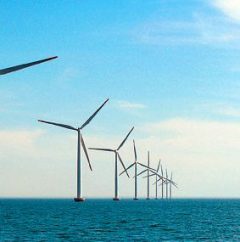
Maryland Act Boosts Offshore Wind Market
Maryland state lawmakers have passed the Clean Energy Jobs Act (CEJA) of 2019, which would incentivize the development of 1.2 GW of additional offshore wind energy off the coast of Maryland. US Wind Country Manager Salvo Vitale testified last month before the Senate Finance Committee and House Economic Matters Committee,,, urging passage of the legislation while citing the significant economic benefits that the legislation would make possible by incentivizing the development of 1,200 MegaWatts of additional offshore wind energy off the coast of Maryland. >click to read<14:14
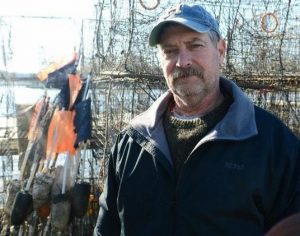
Watermen: Open Anne Arundel oyster sanctuaries to harvesting
Herring Bay near Deale has eight historic oyster bars, all of them protected from harvesting because the area is an oyster sanctuary. But some commercial watermen say working small sanctuaries like Herring Bay could be better for the oysters, water, and people in the long run. Bill Scerbo, president of the Anne Arundel Watermen’s Association, wants to see sanctuaries like those in county waters reopened to commercial fishing. They say right now oysters in some low-salinity sanctuaries, like Herring Bay, aren’t reproducing naturally. “A lot of oysters have died of old age up here and haven’t been replaced,” the Shady Side resident said. >click to read<10:50
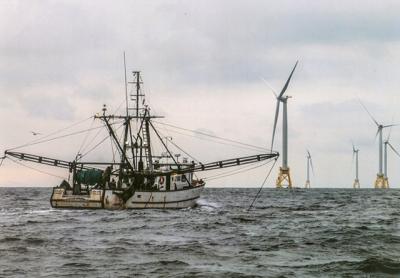
First U.S. Offshore Wind Developer Acts on Fishing Gear
U.S. offshore wind developer Deepwater Wind has adopted a first-of-its-kind procedure designed to prevent impacts to commercial fishing gear from its activities. Deepwater Wind’s Block Island Wind Farm is America’s first offshore wind farm, and the company is currently in active development on utility-scale wind farms to serve Rhode Island, Connecticut, New York, New Jersey and Maryland. The procedure was developed in close coordination with the commercial fishing industry and is based off extensive feedback from fishermen in ports up and down the Atlantic coast. Deepwater Wind believes that keeping fishermen informed is the key to preventing damage to fishing gear. >click to read<18:19
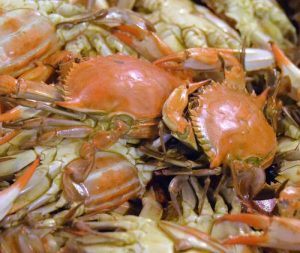
Amid crab industry labor shortage, Maryland Rep. Harris says approval of 15,000 guest worker visas ‘imminent’
Federal immigration officials have agreed to approve 15,000 new guest worker visas for seasonal work, including in a Maryland crab industry grappling with a significant labor shortage, U.S. Rep. Andy Harris said Thursday. U.S Citizenship and Immigration Services would not confirm any changes to its H-2B visa program, which brings 66,000 immigrants to the country for work that employers can show they are unable to hire Americans to do. >click to read<13:09
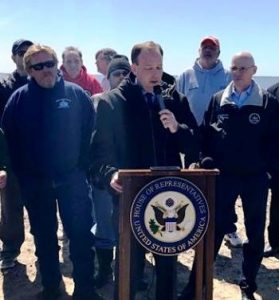
BLACK SEA BASS – THE NEW “WAR BETWEEN THE STATES”
On April 9, 1865, General Robert E. Lee surrendered to General Ulysses S. Grant at the Appomattox Court House in Virginia, signifying the end of the U.S. Civil War. One hundred and fifty-three years to the day, north and south are set to do battle yet again, this time over sea bass. From April 30 through May 3, the Atlantic States Marine Fisheries Commission (ASFMC) will hold its 2018 spring meeting in Arlington, VA, a city that was once the dividing line between Confederates to the South and the Union Army to the north during the bloodiest war in U.S. history. >click to read<12:41
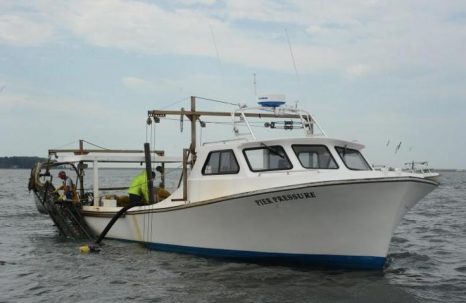
Clam Dredging: A Rebuttal to ShoreRivers by Marc Castelli
I am responding to the op-ed on clam dredging by Mr. Horstman. A reply is necessary because there were many missing and mishandled facts, to the point that it was beyond opinion and became erroneously misleading, which is a concern.,, This is common in op-ed pieces: people set themselves up as an expert, but they aren’t.,, Why are simple facts about how the clam fishery interacts with the environment and natural resources so hard to find in the media? Is it because you, one of the Bay’s environmental “guardians” offer misinformed comments that will try to sway public opinion against clamming? Many of that industry’s best speakers are busy trying to make a living on the water and keep up with the pace of changes forced on it by outside pressures. Simply put they just do not have the time to respond to misleading op-ed pieces. I do. >click to read< 17:18 
Blue Crabs Crest Tipping Point – Maryland and Virginia may limit harvest for the remainder of the season
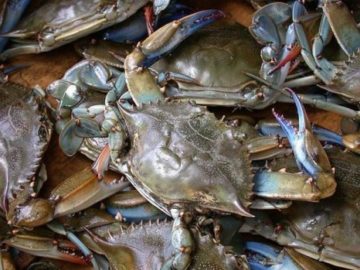 After almost three decades of effort, Maryland’s treasured Chesapeake Bay crustacean, the blue crab, has achieved a major scientific benchmark. The number of spawning females has at last reached the minimum target level for optimum species viability: 215 million sooks. The 2017 Winter Dredge Survey put the female population at well over the minimum, 254 million, an impressive 31 percent increase from the prior year. This is an important moment, as just four years ago (and five years prior to that), the female crab population had been driven to dangerous, even population-collapse, levels.,, To protect overall numbers, the Maryland, Virginia and Potomac River Fisheries Commission has proposed shortening the crabbing season and imposing stricter bushel limits on female crabs. No changes to male crab limits were proposed. click here to read the story 16:25
After almost three decades of effort, Maryland’s treasured Chesapeake Bay crustacean, the blue crab, has achieved a major scientific benchmark. The number of spawning females has at last reached the minimum target level for optimum species viability: 215 million sooks. The 2017 Winter Dredge Survey put the female population at well over the minimum, 254 million, an impressive 31 percent increase from the prior year. This is an important moment, as just four years ago (and five years prior to that), the female crab population had been driven to dangerous, even population-collapse, levels.,, To protect overall numbers, the Maryland, Virginia and Potomac River Fisheries Commission has proposed shortening the crabbing season and imposing stricter bushel limits on female crabs. No changes to male crab limits were proposed. click here to read the story 16:25
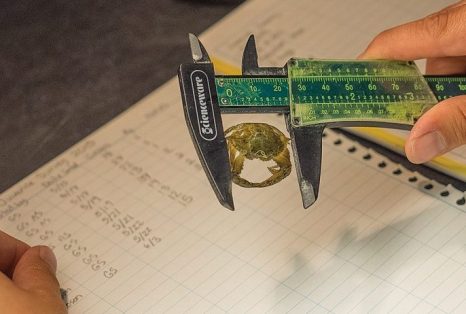
Fishery managers weighing cuts in Bay crab harvest
Chesapeake Bay crabbers will likely face some harvest restriction this season to protect future generations of the iconic crustacean, a move managers say is necessary because of the low population of juveniles. Fishery managers for Maryland, Virginia and the Potomac River Fisheries Commission all say they are considering shortening the season and imposing stricter limits on the harvest of female crabs. They are not proposing changes in male crab catches. News of harvest cuts surprised some crabbers at Maryland’s Blue Crab Industry Advisory Committee last week. The latest winter dredge survey results released in April showed the highest number of female crabs in the 28-year history of the annual count. Female crabs clocked in at 254 million, a 31 percent increase over last year. But the Baywide survey, which counts the crabs in more than 1,000 locations as they burrow in the mud, estimated there were 125 million juvenile crabs in the Chesapeake, a 54 percent decrease from the 271 million found in 2016. That is the lowest tally since 2013 — a year when crabbers also had their catch curtailed — and one of the five lowest estimates since 1990, managers said. Click here to continue reading the article 21:38
MD lawmakers call hearing on DNR crab manager’s firing
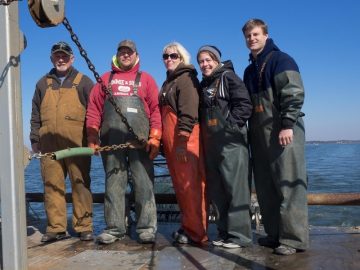 Maryland lawmakers have scheduled a special hearing to investigate the Hogan administration’s firing of the state’s longtime manager of the blue crab fishery. The House Environment and Transportation Committee and the Senate Education, Health, and Environmental Affairs Committee plan to meet jointly Monday to seek more information on the termination last month of Brenda Davis. A 28-year employee of the state Department of Natural Resources, Davis was dismissed Feb. 21 after a small group of watermen complained about her and crabbing regulations to Gov. Larry Hogan. Sen. Paul Pinsky, a Prince George’s County Democrat, said the committees want to know whether politics is influencing science and scientific decision-making in the department. “We have to shine a light on the firing of Brenda Davis,” Pinsky said Thursday. “It seems that the Hogan administration has made her a sacrificial lamb to a small group of watermen who have, to date, not been able to change state crabbing policy.” continue reading the story here 20:17
Maryland lawmakers have scheduled a special hearing to investigate the Hogan administration’s firing of the state’s longtime manager of the blue crab fishery. The House Environment and Transportation Committee and the Senate Education, Health, and Environmental Affairs Committee plan to meet jointly Monday to seek more information on the termination last month of Brenda Davis. A 28-year employee of the state Department of Natural Resources, Davis was dismissed Feb. 21 after a small group of watermen complained about her and crabbing regulations to Gov. Larry Hogan. Sen. Paul Pinsky, a Prince George’s County Democrat, said the committees want to know whether politics is influencing science and scientific decision-making in the department. “We have to shine a light on the firing of Brenda Davis,” Pinsky said Thursday. “It seems that the Hogan administration has made her a sacrificial lamb to a small group of watermen who have, to date, not been able to change state crabbing policy.” continue reading the story here 20:17
Watermen’s Appreciation Day – A day on the bay of the Eastern Shore
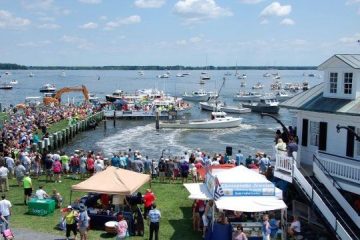 “In Maryland here were called watermen which is a term that’s -a follower, we’re not only crabbers, we’re clammers, we’re oyster men, we’re hunters, we’re fishermen, we do it all,” said Captain Robert Newberry of the Watermen’s Association. This all used to be done be sail . The Chesapeake Bay is the largest estuary in the world and the heritage of the Watermen’s appreciation day celebrates just that. This is the 7th annual event here at St. Micheal’s celebrating the eastern shores’ watermen. And folks came from all over to enjoy it. The Boat docking contests took the win for entertainment at the event as folks from age 14 to 60 tried docking their boats the fastest and the smoothest – all for bragging rights. Read the rest here 08:20
“In Maryland here were called watermen which is a term that’s -a follower, we’re not only crabbers, we’re clammers, we’re oyster men, we’re hunters, we’re fishermen, we do it all,” said Captain Robert Newberry of the Watermen’s Association. This all used to be done be sail . The Chesapeake Bay is the largest estuary in the world and the heritage of the Watermen’s appreciation day celebrates just that. This is the 7th annual event here at St. Micheal’s celebrating the eastern shores’ watermen. And folks came from all over to enjoy it. The Boat docking contests took the win for entertainment at the event as folks from age 14 to 60 tried docking their boats the fastest and the smoothest – all for bragging rights. Read the rest here 08:20
Oyster poaching continues on bay despite enforcement efforts

Maryland, Virginia Members Disagree on Atlantic Oil Drilling
 The Obama administration’s recent proposal to lease oil and gas drilling in a swath of the Atlantic Ocean generated the expected mix of cheers and jeers on Capitol Hill, but local reaction was mostly divided along state borders rather than party affiliations. Marylanders are reluctant, while Virginians appear to want to charge ahead, especially if it might mean more cash in their state coffers Read the rest here 16:12
The Obama administration’s recent proposal to lease oil and gas drilling in a swath of the Atlantic Ocean generated the expected mix of cheers and jeers on Capitol Hill, but local reaction was mostly divided along state borders rather than party affiliations. Marylanders are reluctant, while Virginians appear to want to charge ahead, especially if it might mean more cash in their state coffers Read the rest here 16:12
Two watermen plead guilty in striped bass poaching case
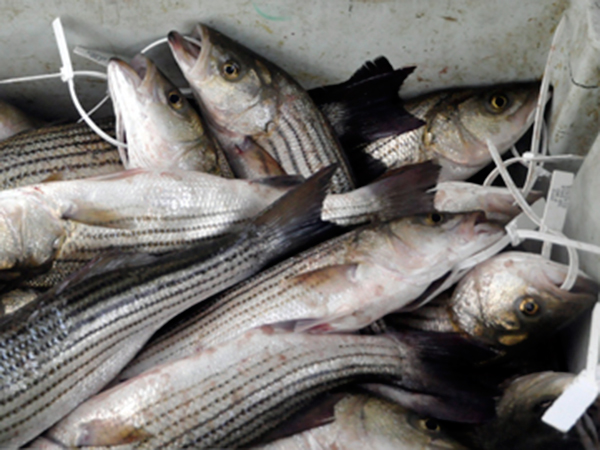 Two Tilghman Island watermen pleaded guilty Friday in U.S. District Court to illegally taking 185,925 pounds of striped bass from the Chesapeake Bay. Michael D. Hayden, 41, and William J. Lednum, 42, admitted to selling the striped bass for $498,293 through a ring they operated between 2007 and 2011, according to court documents. Read more here 07:24
Two Tilghman Island watermen pleaded guilty Friday in U.S. District Court to illegally taking 185,925 pounds of striped bass from the Chesapeake Bay. Michael D. Hayden, 41, and William J. Lednum, 42, admitted to selling the striped bass for $498,293 through a ring they operated between 2007 and 2011, according to court documents. Read more here 07:24
Virginia abided by menhaden catch limit for 2013
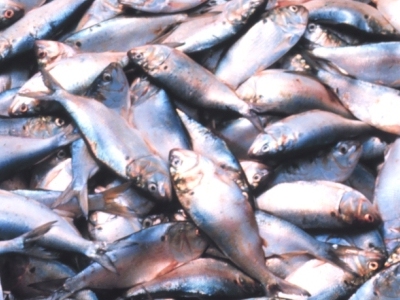 In late 2012, Virginia and other Atlantic states adopted the first coast-wide catch limit for menhaden in a historic effort to save the “most important fish in the sea” from years of overfishing. Read more here
In late 2012, Virginia and other Atlantic states adopted the first coast-wide catch limit for menhaden in a historic effort to save the “most important fish in the sea” from years of overfishing. Read more here
20:06
Maryland assigning commercial fishermen catch shares – will have individual quotas of striped bass
State fisheries officials say they’re not trying to hurt watermen. “Whenever you have a major change like this … you have winners and losers,” said Tom O’Connell, state fisheries director. “It sorts itself out.” Read more@baltimoresun 00:57
Menhaden rules to be heard Today by Md. Administrative, Executive and Legislative Review Committee
For watermen, this is a chance for their voice to be heard on regulations that some, like Bob Newberry, who is a co-organizer for the Harvesters Land and Sea Coalition, say are negatively affecting their livelihood and aren’t necessary. “We’re just asking for our day in front of the AELR Committee to explain our side of the situation,” Newberry said. “At least for once the watermen of the state of Maryland are going to be able to have their side of the story heard,” [email protected] 11:57
Frosh bill banning shark fin trade passes both Maryland chambers (filed under “another dumb politician”)
 Gazette.Net – “We have a global problem. We have a problem in the Chesapeake Bay, because sharks are being killed just for their fins in many places in the world,” Frosh said. “This is a bill that takes a small step toward fixing that.” continued
Gazette.Net – “We have a global problem. We have a problem in the Chesapeake Bay, because sharks are being killed just for their fins in many places in the world,” Frosh said. “This is a bill that takes a small step toward fixing that.” continued
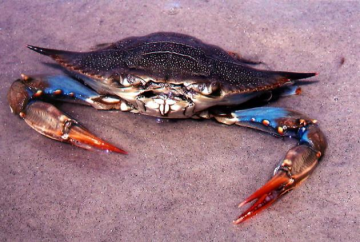
MD’s Crab Harvest Leads Nation – WBAL News
Maryland’s crab harvest last year led the nation. That’s according to figures released Wednesday by the National Marine Fisheries Service.
http://www.wbal.com/article/94116/2/template-story/MDs-Crab-Harvest-Leads-Nation






